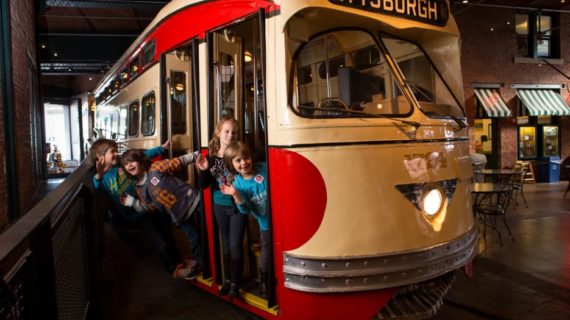
The inspiring work happening at South Allegheny can help families to explore social justice during the holidays and beyond
Photos courtesy of South Allegheny School District.
In the fall of 2022, a group of students from South Allegheny High School got the chance to attend the Eradicate Hate Global Summit in downtown Pittsburgh. They spent a day listening to inspiring speakers and watched a powerful documentary about the Tree of Life synagogue shooting.
Perhaps most impactful, they met with students from many other Pittsburgh-region schools and even a few from as far away as Ohio. Together, these teens discussed their concerns about the world and brainstormed about how to create a kinder, more just culture in America.
The teens returned to South Allegheny inspired and hungry to form their own Eradicate Hate group. They wanted to understand more about civics and the ways they could impact the world. What could they learn from the pursuit of social justice in American history? How might they work to create a kinder and more just culture at their school and beyond?
As they began this work, these students had one particularly valuable ingredient: Adults who were ready to support them as they worked to help improve a world they will one day inherit.

Since that first visit to the Eradicate Hate Global Summit, students at South Allegheny have continued their social justice work and they’ve participated in many events, including the Transforming Tomorrow Student Summit and South Fayette School District’s Uncommon Conference.
As 2024 draws to a close and we enter the season of reflection and giving, Kidsburgh spoke with South Allegheny’s workforce development coordinator Laura Thomson and teacher Ellen Eyth. Both work with South Allegheny’s Eradicate Hate group and Eyth is a winner of the Shyne Teacher of the Year award.
Though the students spearhead their own social justice work, we know adults can play a valuable role. So Kidsburgh asked Eyth and Thomson how parents and other caregivers can help all Pittsburgh-region kids to understand and pursue their roles as future civic leaders.
HOW CAN ADULTS SUPPORT KIDS AND TEENS?
“I think of it in the same way that I support students in workforce development,” says Thomson. “It’s all about experience and exposure — all the time, all day — and creating relationships.”
At South Allegheny, that takes many forms. Along with attending regional events, the students hear from speakers who have participated in the social justice history of our country.
“We had a speaker who came to us from Classrooms Without Borders,” Thomson says. “He lives in Israel and he came here last year to talk to Eradicate Hate students first-hand about his experiences. And we have traveled across the state to meet people who have marched with Martin Luther King and John Lewis when they were teenagers.”
These experiences are educational and impactful for students, she says.
“And just like workforce development with students, you never know when it’s going to resonate and when that learning is going to emerge,” Thomson explains. “I may take kids down to the Carpenters Union or the iron workers union. And it may not be until they’re 26 that they’re ready to come back to that experience. It’s still part of their schema, their experience, and when they’re ready to come back to it, they have it. I said to one of my students recently: When you’re ready to be a congresswoman, you have these experiences.”
Parents may not be able to offer these same kinds of experiences. But it’s easy to find many different documentaries and interviews with historic figures streaming online. Choose a few to watch with your kids and discuss what you’ve learned. You can also attend lectures in the Pittsburgh area.

Then think about first-hand experience your family could have.
“I like exploring our collective history with students, and I like putting students in the places where history happened, with the people who were there when it happened,” Thomson says. “So that’s what we do. We’re on the road a lot.”
Parents can plan trips for their own families with this in mind.
Just one of many possible destinations: Atlanta is home to both the King Center for Nonviolent Social Change (and right across the street, Ebenezer Baptist Church where MLK preached), and the National Center for Civil and Human Rights (undergoing expansion this spring and summer, but due to reopen this fall).
Adults can also support students in raising funds for their school groups travel to historic sites in the Pittsburgh region and beyond, so they can experience these places first-hand and hear the voices of those who have lived this history.
The South Allegheny students have also visited the Flight 93 National Memorial in Shanksville, Pa., and the African American History and Heritage Museum and the Holocaust Museum, both in Washington, D.C.
Locally, they have also visited the Tree of Life synagogue. “It’s two words in life: experience, exposure. That’s what it is,” Thomson says. “And you hope that starts young, and they always have that to go back to.”
Another effort: The students have designed and made t-shirts that say Love (heart) Your Neighbor.
“They actually, physically make the shirts themselves,” Eyth says, “so there’s some ownership of that, too. And they’ll see each other wearing them, working on them. So it’s almost contagious.”
That points up another great strategy for families at the holidays and year-round: “I would say for parents and grandparents to get to know your neighbor. And not just the geographical neighbors, but other people” Eyth says.
“Take kids to those community events. Get to know people. Model the example of getting to know people and talking with people that you don’t necessarily know.”















